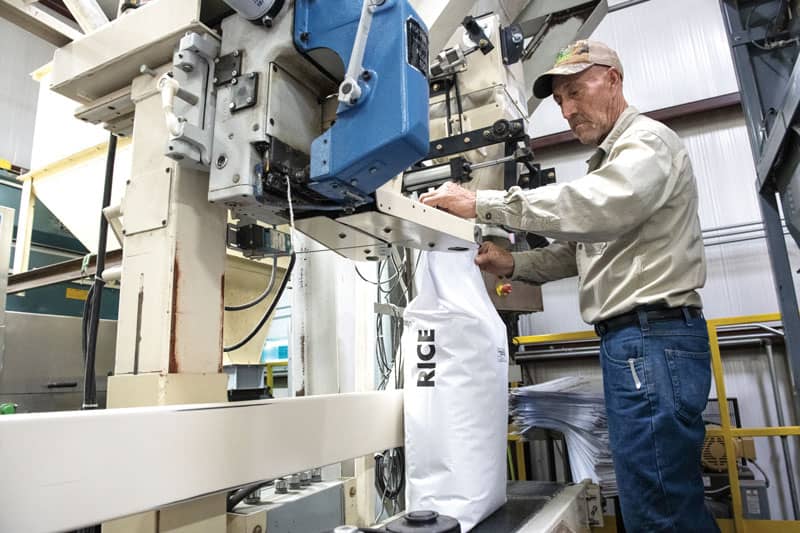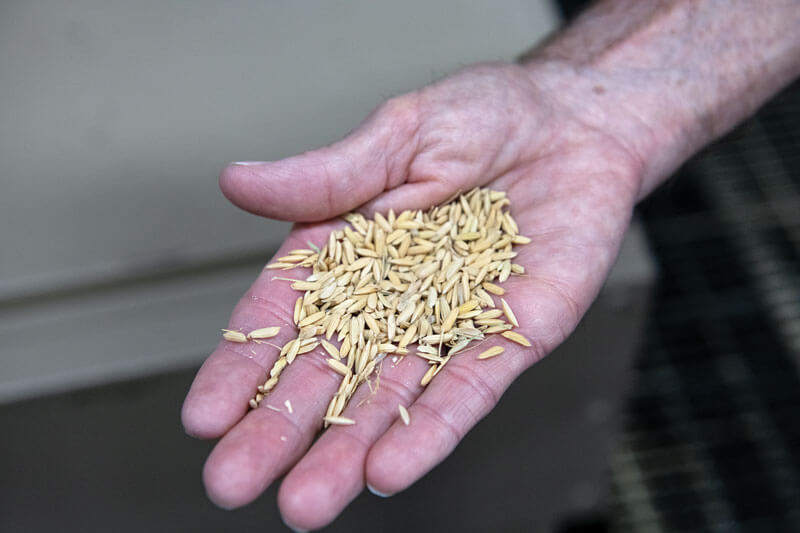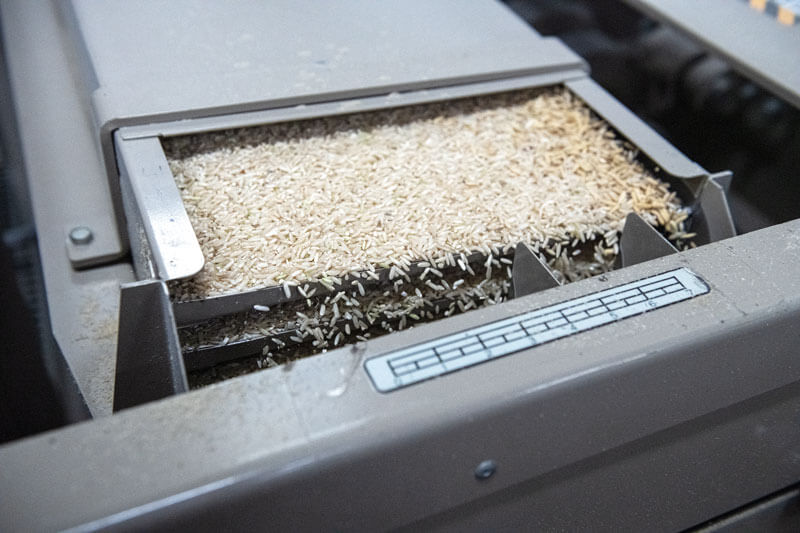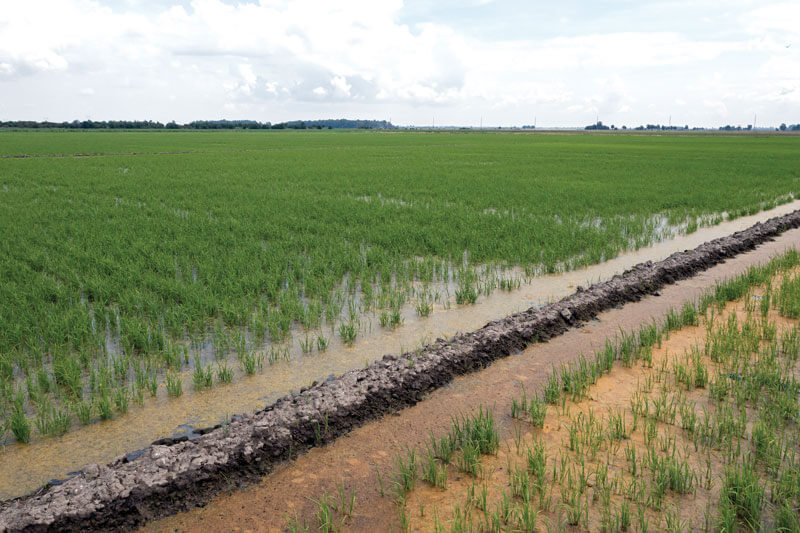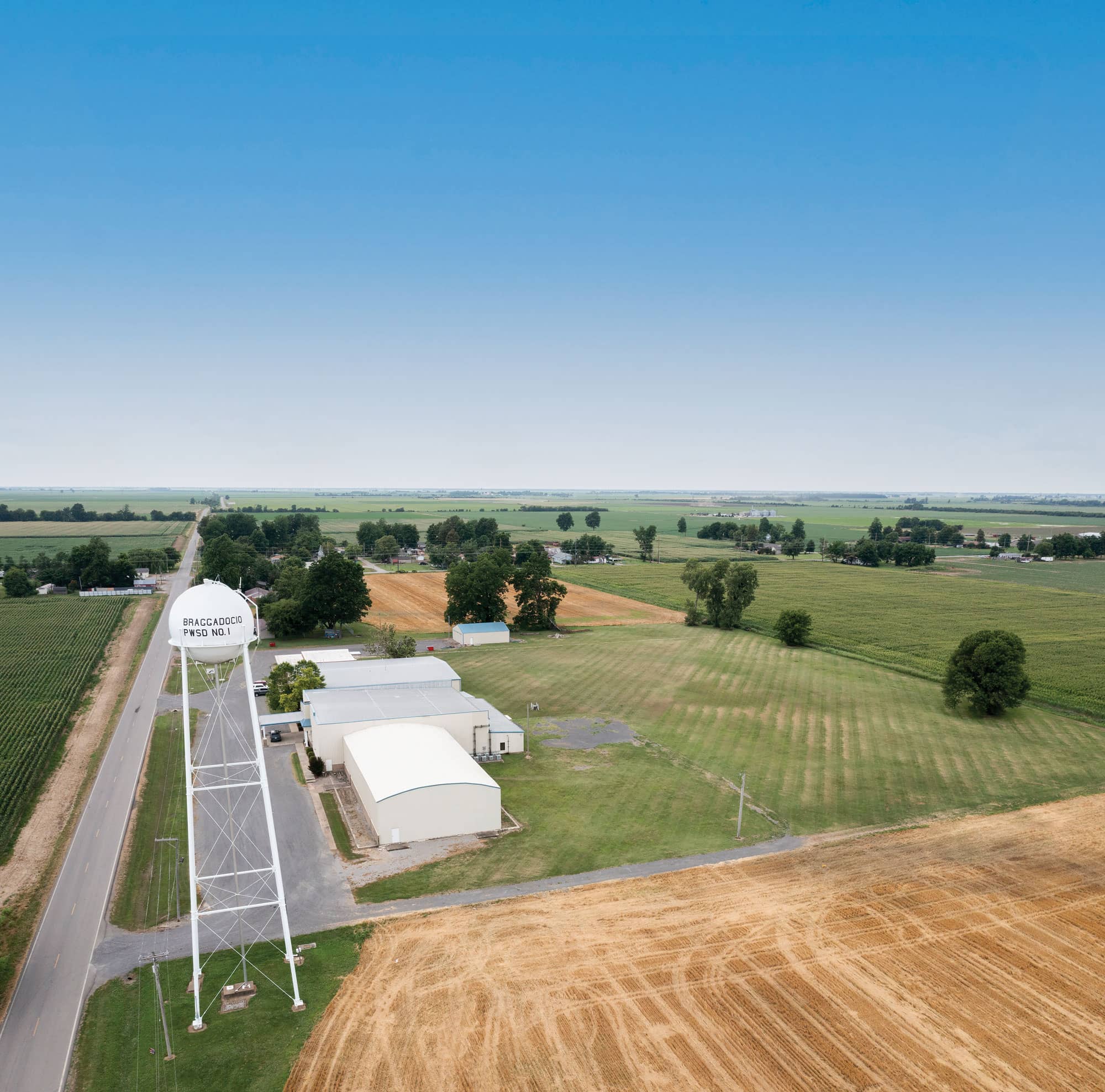
Bragging on Braggadocio
October 13, 2021
Written By Jason Jenkins
After Years of Struggles, One Bootheel Farm Family Found Success Growing Organic Crops
In a post-pandemic world, the video teleconference has become an essential tool for conducting business—even for farmers like Steve McKaskle of Braggadocio, Mo. He’s found unique ways to use the technology to his advantage.
“We’re going to do a little show-and-tell this afternoon,” he said in a recent pitch meeting, propping a stalk of white corn against the wall behind his desk. He positioned his webcam so that the plant could be seen over his shoulder. Soon, he was chatting with a buyer for a well-known multinational retailer. “I’m guessing they’ve never had anyone do this before.”
Just a few short minutes into the call, Steve stood up and started his pitch.
“Can you see this OK? I just pulled this stalk out of the field behind our house. It’s where our organic white corn grits come from. Let me show you,” he said, pulling an ear from the stalk and removing the husk. “This is what it looks like before we grind it and make grits. Our grits have a wonderful, rich flavor because we keep the germ. We don’t remove it like a lot of store-bought grits.”
Stone-ground organic white corn grits are just one of nearly a dozen organic grain products that are grown, processed and packaged by McKaskle Family Farm. Steve and his wife, Kaye, launched the Braggadocio line of products more than a decade ago. Today, it also includes organic brown and white long-grain rice, brown and white basmati rice, brown and white rice flour, popcorn, popcorn cornmeal, popcorn polenta, and white corn cornmeal.
While the name of their hometown may mean “empty boasting,” the McKaskles are humble about what they’ve accomplished. The fifth-generation farmers didn’t start out raising organic crops in Pemiscot County, but it’s where they’ve found their niche and their success.
“We first got into organics to make more money, but now we do it because we think it’s the right thing to do,” Steve said.
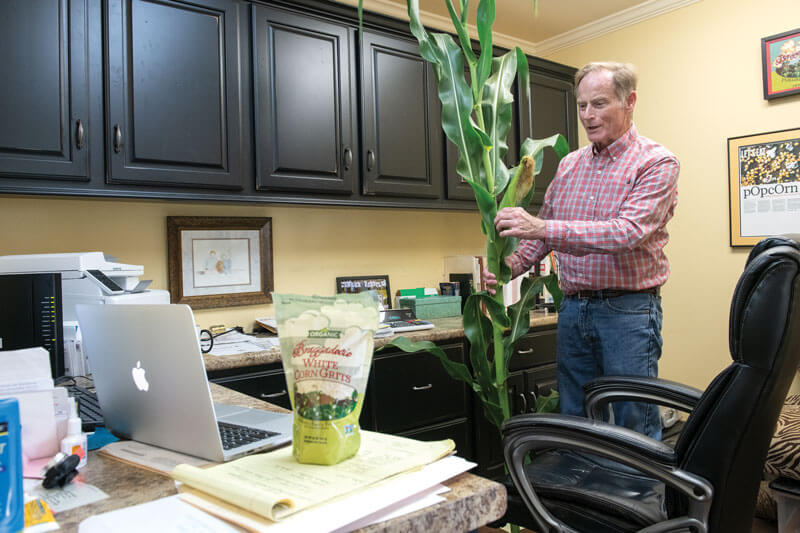 During a video teleconference with a buyer for a well-known multinational retailer, Steve McKaskle does a little “show-and-tell” explaining exactly where Braggadocio White Corn Grits originate; Since 2015, the McKaskles have milled their own rice in a facility built on the farm.
During a video teleconference with a buyer for a well-known multinational retailer, Steve McKaskle does a little “show-and-tell” explaining exactly where Braggadocio White Corn Grits originate; Since 2015, the McKaskles have milled their own rice in a facility built on the farm.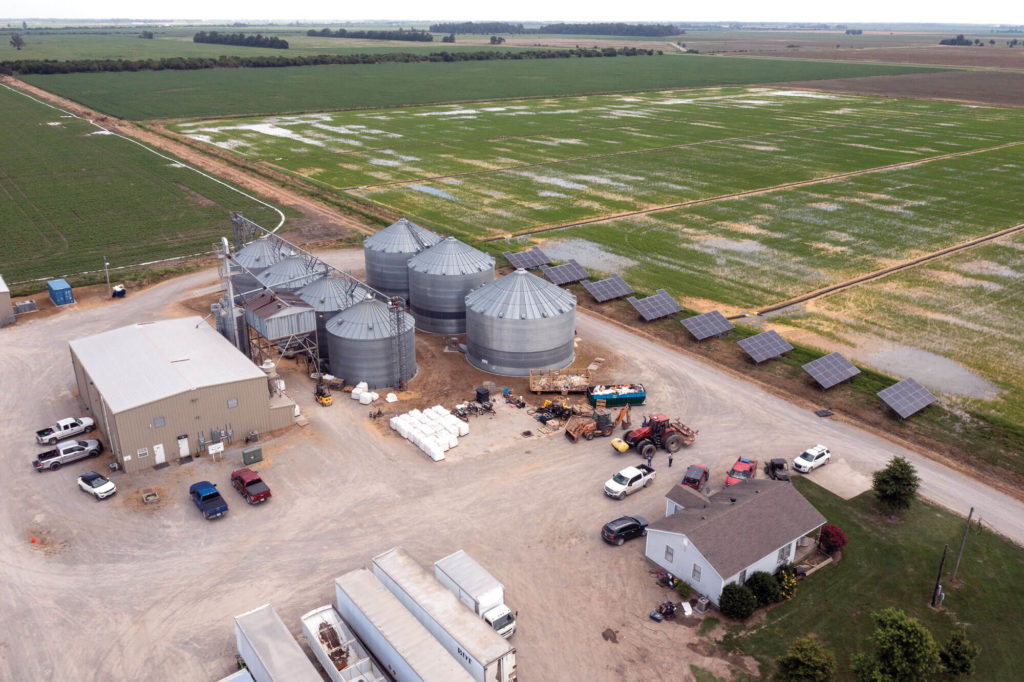 They mill rice 15 hours a day, five days a week
They mill rice 15 hours a day, five days a week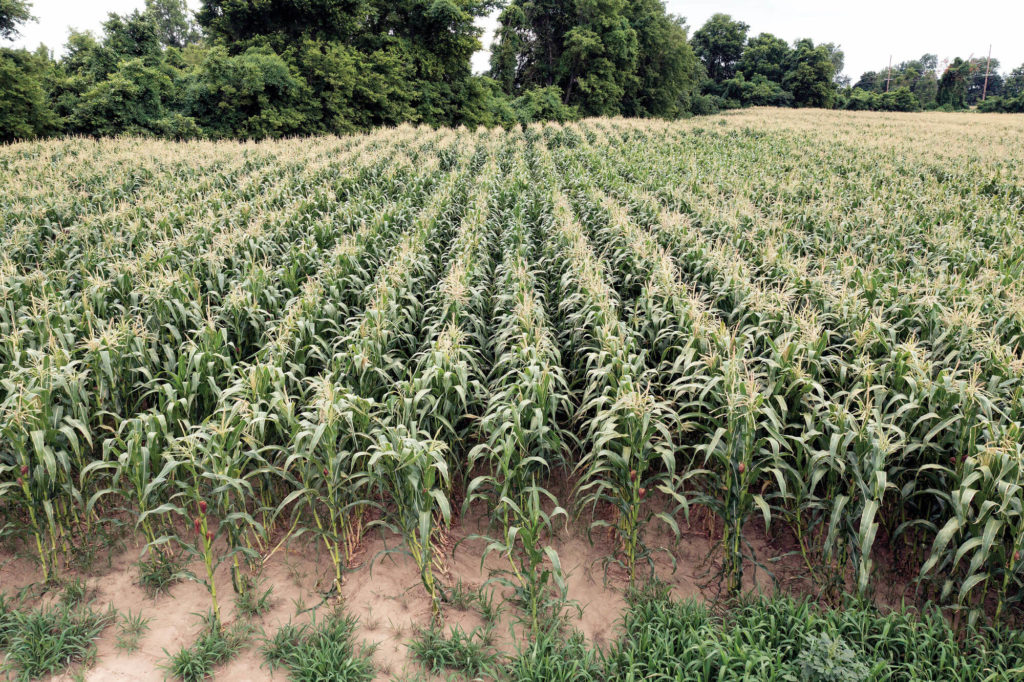 Popcorn was one of the first crops the McKaskles raised as they transitioned their operation toward organic production
Popcorn was one of the first crops the McKaskles raised as they transitioned their operation toward organic production
Cotton Conundrum
While Kaye’s family had farmed for generations, Steve had no experience raising crops. The son of a physician, he intended to follow in his father’s footsteps. After graduating from Caruthersville (Mo.) High School, he attended the University of Mississippi.
“I started off as pre-med, but let’s just say that organic chemistry had different plans for me,” he said with a laugh. “Kaye and I got married in 1971, and I switched to political science, thinking I’d go to law school. After I graduated, my father-in-law—who farmed some but also ran a cotton gin and a country store right here in Braggadocio—suggested we come back and try farming. So, we started off with 300 acres in 1973.”
Because the family operated a gin, the McKaskles raised conventional cotton, rotating with soybeans, for the next two decades. Steve recalled tough times.
“1980 was probably the worst,” he said. “We were in line with everybody else getting food stamps that year. It was frustrating, but we kept farming.”
Then, in the winter of 1992, Steve learned of a new opportunity. Esprit, a clothing manufacturer, was seeking farmers to grow organic cotton for its products.
“I was real interested in anything different than what we had been doing because nobody was making any money. It was horrible,” Steve said. “At the time, we were getting about 35 to 40 cents a pound for cotton, and Esprit offered us $1 per pound. I was in like Flynn.”
The McKaskles planted 40 acres of organic cotton in 1993, and the crop did well. “We made a lot of money that first year,” Steve said. “It was great, so we did more.”
For the remainder of the 1990s and into the 21st century, McKaskle Family Farm would become organic cotton suppliers for several clothing manufacturers, including Nike and Patagonia. Steve describes the organic industry at the time as a “puppy,” still growing and developing.
By 2006, they were farming 1,500 acres organically and experimenting with other organic crops, including popcorn and blue corn. Steve had even approached an Arkansas-based rice mill about the possibility of supplying organic rice.
Then, in an instant, everything changed.
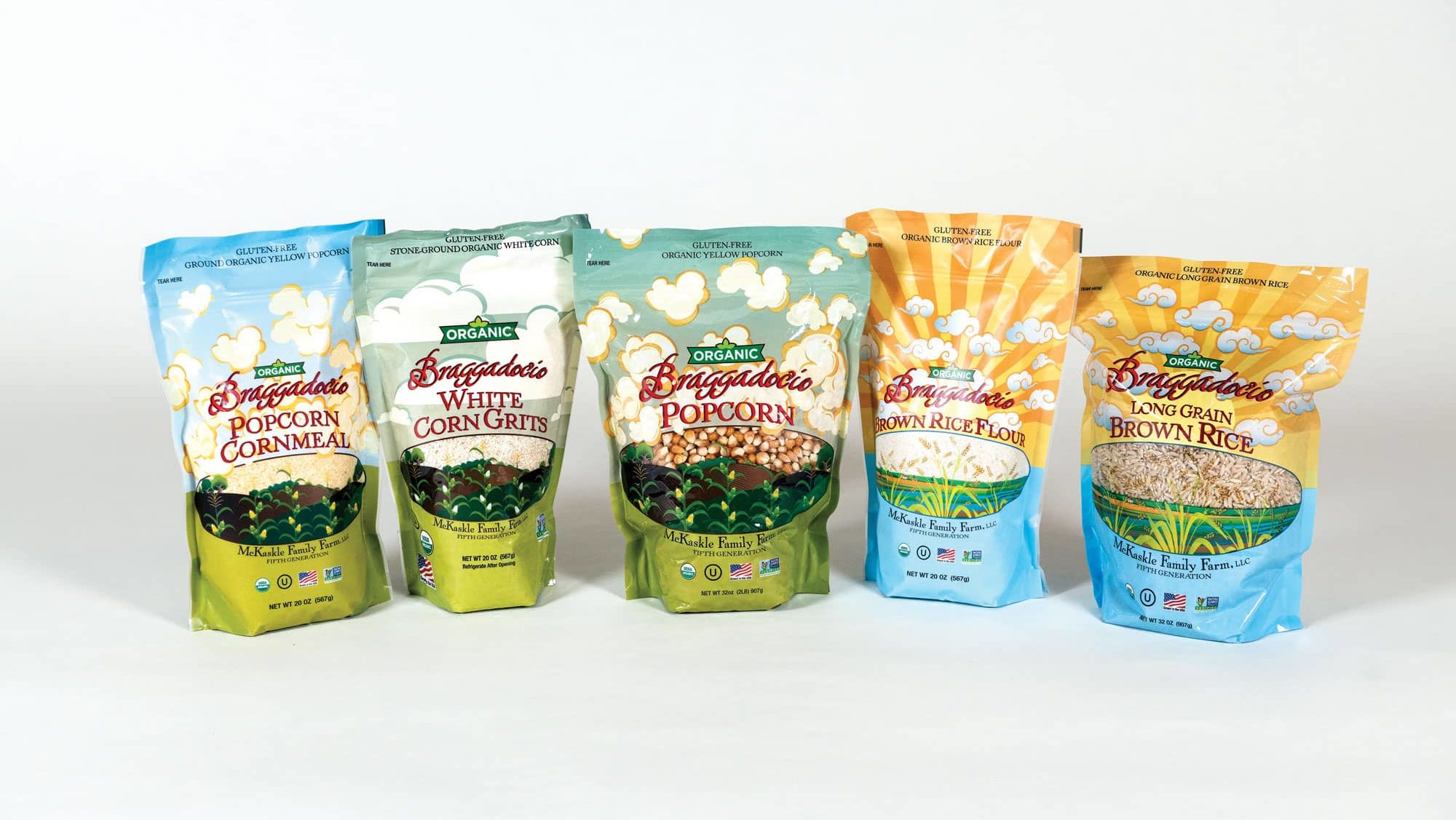
Triumph after Tragedy
On the afternoon of April 2, 2006, a squall line of severe storms that developed as a cold front tracked across the central United States. The clash of deep low pressure and warm, humid air spawned a total of 66 confirmed tornadoes across seven states, including Missouri.
One of the most powerful twisters that day carved a path of destruction across the Bootheel. Along that path was Braggadocio and McKaskle Family Farm.
“I saw it coming. It was a mile wide,” Steve recalled. “Kaye had a cousin nearby with a basement, so we drove to their house. We barely made it there in time.”
The McKaskles emerged from that basement to a new reality.
“Everything on the farm—the barn, the shop, the grain bins, our two-story farmhouse—was destroyed,” Steve said. “We couldn’t grow cotton. The gin was gone. The only thing left of our cotton pickers were the heads. The tornado blew everything away.”
While cotton was no longer an option, organic rice was still a possibility. He had one 80-acre field that was precision graded and capable of being flooded for rice production. Steve called the Arkansas mill and got a contract.
“We grew our first 80 acres, and it went great. We made a profit,” said the 70-year-old. “From there, we started grading more ground and adding more acres and different varieties of organic rice.”
Chipotle’s ‘Rice Whisperer’
For several years, the McKaskles raised organic rice and popcorn, selling it to companies who then packaged and sold it at retail. In 2010, the couple decided to cut out the middleman, so to speak, and created their Braggadocio brand.
“We started with the popcorn and got into Whole Foods in Memphis,” Steve said. “Then we started doing the same thing with our rice.”
In 2012, Steve secured a meeting with corporate representatives from Chipotle Mexican Grill. The restaurant chain was seeking suppliers of non-GMO ingredients, and McKaskle Family Farm’s organic rice fit the bill.
“We flew out to Denver, where their corporate headquarters were located at the time, and had a meeting,” said Steve, who Chipotle dubbed the “Rice Whisperer” in an advertising campaign. “Two weeks later, we were shipping rice to the Chipotle in Little Rock, Ark. Now, we supply 60 locations, and they’d like us to expand to 110. We’re their only non-GMO organic rice supplier.”
To gain more control of processing and further their fledgling company’s vertical integration, the McKaskles built their own rice mill on the farm in 2015. Today, the mill runs 15 hours a day, five days a week. In addition to Chipotle and their Braggadocio-branded products, Steve and Kaye also market their rice under two other brand names: Texas Best and Hard Bargain. Their products can be found in major grocery stores across the country, including Whole Foods, Publix Super Markets and H-E-B Grocery Company.
The line of organic corn products also has expanded during the past decade. Alongside Braggadocio whole-kernel popcorn, which they now also package for other private labels, the McKaskles sell popcorn cornmeal and polenta. White corn, most commonly used to make tortillas and tortilla chips, is grown and processed into both cornmeal and grits.
While growing organic crops has had its challenges, it’s also allowed Steve and Kaye to create real opportunities for future generations. The couple has two daughters, Emily Ellis, who lives in nearby Blytheville, Ark., and Anne Marie McKaskle Goad, who lives in Tupelo, Miss., along with five grandsons. Son-in-law Carter Ellis works on the farm, overseeing the rice mill and overall farming operations, and the Ellises’ three sons help as well.
“We truly are a family farm,” Steve added.
Looking toward the future, the McKaskles already have their eyes on the newest trend in food: sustainability.
“Our new product is going to be ‘climate friendly’ rice, and we’re real excited about it,” Steve said. “It’s focused on soil regeneration and carbon credits, which is getting a lot of talk these days. It’s more than a buzzword.”



